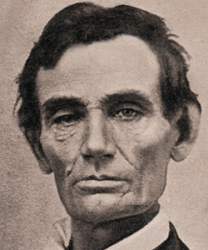Record Data
Transcription
Seventh Debate between Abraham Lincoln and Stephen A. Douglas
Mr. Douglas:
So long as we live under a common constitution, so long as we live in a confederacy of sovereign and equal States, joined together as one for certain purposes, that any political creed is radically wrong which cannot be proclaimed in every State, and every section of that Union alike. I took up Mr. Lincoln's three propositions in my several speeches, analyzed them, and pointed out what I believed to be the radical errors contained in them. First, in regard to his doctrine that this government was in violation of the law of God which says, that a house divided against itself cannot stand, I repudiated it as a slander upon the immortal framers of our constitution. I then said, have often repeated, and now again assert, that in my opinion this government can endure forever, (good) divided into free and slave States as our fathers made it,---each State having the right to prohibit, abolish or sustain slavery just as it pleases. (``Good,'' ``right,'' and cheers.) This government was made upon the great basis of the sovereignty of the States, the right of each State to regulate its own domestic institutions to suit itself, and that right was conferred with understanding and expectation that inasmuch as each locality had separate interests, each locality must have different and distinct local and domestic institutions, corresponding to its wants and interests. Our fathers knew when they made the government, that the laws and institutions which were well adapted to the green mountains of Vermont, were unsuited to the rice plantations of South Carolina. They knew then, as well as we know now, that the laws and institutions which would be well adapted to the beautiful prairies of Illinois would not be suited to the mining regions of California. They knew that in a Republic as broad as this, having such a variety of soil, climate and interest, there must necessarily be a corresponding variety of local laws---the policy and institutions of each State adapted to its condition and wants. For this reason this Union was established on the right of each State to do as it pleased on the question of slavery, and every other question; and the various States were not allowed to complain of, much less interfere, with the policy of their neighbors.
* * *
Mr. Lincoln:
Any man can say that who does not see anything wrong in slavery, but no man can logically say it who does see a wrong in it; because no man can logically say he don't care whether a wrong is voted up or voted down. He may say he don't care whether an indifferent thing is voted up or down, but he must logically have a choice between a right thing and a wrong thing. He contends that whatever community wants slaves has a right to have them. So they have if it is not a wrong. But if it is a wrong, he cannot say people have a right to do wrong. He says that upon the score of equality, slaves should be allowed to go in a new Territory, like other property. This is strictly logical if there is no difference between it and other property. If it and other property are equal, his argument is entirely logical. But if you insist that one is wrong and the other right, there is no use to institute a comparison between right and wrong. You may turn over everything in the Democratic policy from beginning to end, whether in the shape it takes on the statute book, in the shape it takes in the Dred Scott decision, in the shape it takes in conversation or the shape it takes in short maxim-like arguments---it everywhere carefully excludes the idea that there is anything wrong in it.
That is the real issue. That is the issue that will continue in this country when these poor tongues of Judge Douglas and myself shall be silent. It is the eternal struggle between these two principles---right and wrong---throughout the world. They are the two principles that have stood face to face from the beginning of time; and will ever continue to struggle. The one is the common right of humanity and the other the divine right of kings. It is the same principle in whatever shape it develops itself. It is the same spirit that says, ``You work and toil and earn bread, and I'll eat it.'' [Loud applause.] No matter in what shape it comes, whether from the mouth of a king who seeks to bestride the people of his own nation and live by the fruit of their labor, or from one race of men as an apology for enslaving another race, it is the same tyrannical principle. I was glad to express my gratitude at Quincy, and I reexpress it here to Judge Douglas---that he looks to no end of the institution of slavery. That will help the people to see where the struggle really is. It will hereafter place with us all men who really do wish the wrong may have an end. And whenever we can get rid of the fog which obscures the real question---when we can get Judge Douglas and his friends to avow a policy looking to its perpetuation---we can get out from among them that class of men and bring them to the side of those who treat it as a wrong.



